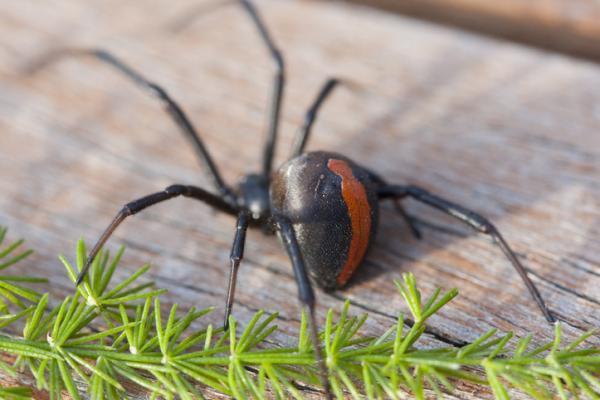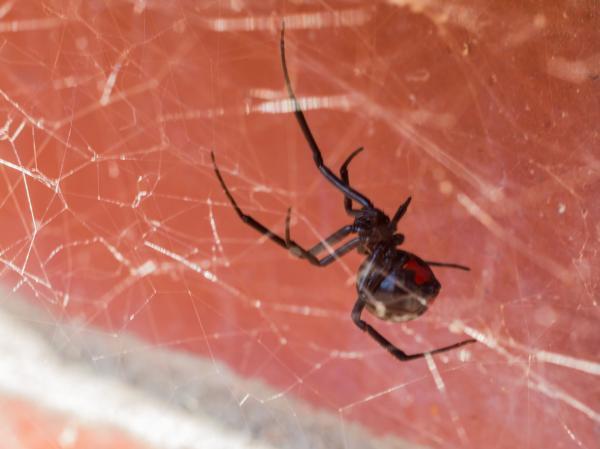My Cat Was Bitten by a Spider



See files for Cats
Cats will try to catch anything that stimulates their curiosity. Even trying to catch the smallest of creatures can take up the best part of an afternoon. In most cases, a cat won't take on a prey they can't handle. If they have any sense of danger, they are more likely to run away and only attack if cornered. Spiders provide a different problem. Their relatively small size makes them seem like easy prey, but some small spiders can pack a dangerous bite. If that spider is venomous, then the encounter has the potential to be deadly.
At AnimalWised, we look at what happens when my cat was bitten by a spider. We look at the potential dangerous of spider bites in cats and what action we may need to take if it happens to our cat.
Are spiders dangerous to cats?
Cats have an acute hunting instinct. So much so that, even though we provide them with adequate food to eat, they will still exercise this instinct by hunting small prey, even if they don't intend to ingest them. Add to this a natural curiosity, they will search out anything in their periphery if it seems like good game. Although the vast majority are harmless, some can pose a threat to our cats.
The spider populations of a given region will vary greatly. For example, there are not many venomous spiders in large parts of northern Europe, but sub-tropical regions can have many. However, there are numerous spiders across the world which can be dangers to cats. These include the black widow (Latrodectus mactans) and the redback spider (Latrodectus hasselti), both part of the genus Latrodectus. Spiders in the Loxosceles genus also stand out, with the brown recluse (Loxosceles reclusa) being one of the best-known.
While some spider bites are fatal to humans, even many venomous spiders will not have a bite which is likely to kill a person. This is because the spider may not be able to inject enough venom and the size the of the human helps them cope. This is not the case with cats. They are much smaller animals and do not have an organism which can fight back as easily.
For example, there are few cases of black widow spiders killing adult humans. However, their venom is highly toxic to cats. If the poisoning is severe, it can lead to vital organ shut down. For brown recluse spiders, the venom can cause necrosis of skin tissue. This can lead to bacterial infection or even spread to the internal organs.
For readers in Great Britain, take a look at our article on venomous spiders in the UK.

Symptoms of a spider bite in cats
The symptoms that the cat manifests will depend on the species of spider which bites the cat. Most small non-venomous spiders will not be able to bite the cat in a way that manifests symptoms. If the spider is non-venomous, but is able to bite, then the result may be slight redness and inflammation. For spiders with mild venom, the cat may feel a little numbness on the bite site.
However, if a spider bite does agitate the cat, it can lead to secondary problems. When swelling causes itchiness, the cat may try to scratch the area or start overgrooming. This can result in wounds appearing which can lead to secondary infections and even abscesses in the cat's skin.
When venomous spiders bite cats, especially highly toxic spiders, the symptoms can vary. For example, when a brown recluse spider bites a cat, the bite can turn necrotic. This means cells in the tissue around the bite site begin to die, leading to hardness in the skin during the first 6 hours after being bitten. Over time the bite wound will turn purple, then black and a dark scab will form which turns into an ulcer. They may also have an increased heart rate, fever, vomiting, diarrhea, jaundice and, potentially, become comatose.
When a cat is bitten by a black widow spider, the symptoms can include:
- Tremors
- Stiffness of the abdomen
- Shortness of breath
- Flaccid paralysis
- Hyperexcitability
- Vocalizations
- Hypersalivation
- Tachycardia
- Diarrhea
- Vomiting
- Disorientation
- Restlessness
- Seizures
- Eat
- Death in 85% of cases
Lastly, some cats are also at risk when bitten if they have an allergy to spiders. When this occurs, the cat will experience an allergic reaction and can go into anaphylactic shock in acute cases.

What to do if my cat is bitten by a spider?
If we have seen that our cat has been bitten by a dangerous spider or we suspect it due to the symptoms and the area in which we are, we must urgently go to the veterinary center. If you have doubts about the species, it is recommended to take a photograph and show it to a professional who can identify with certainty the spider's species.
This information is important so the veterinarian can administer the correct antidote specific for the spider species. There is a black widow antidote that is diluted and given intravenously for 30 minutes to an hour. The red back antidote is given intramuscularly and is effective for up to two weeks after the bite, if clinical signs are maintained.
Supportive symptom management treatment may be required to mitigate pain. Muscle relaxants, such as benzodiazepines, and 10% calcium gluconate should be prescribed at the veterinary center to control fasciculations and muscle cramps.
Whatever spider has bitten them, the cat's prognosis will depend on its species, the amount of venom they have received, where the bite is located, the underlying health of the cat and other factors. It is important to note that the vast majority of spider bites will not pose a serious threat to a cat's health. However, if we are in any doubt as to the type of spider by which they have been bitten, we will need to take them to a veterinarian right away. Species like the red back spider have a high mortality rate in cats when bitten.

Home remedies for spider bites in cats
Since most spider bites in cats are mild and only cause slight irritation, swelling, redness and itching. We can alleviate this inflammatory process with the application of cold compress. This can be done by simply wrapping some ice or frozen food in a dish towel and applying it for short periods over the area. Do not put the cat's skin in direct contact with ice.
With the cold, vasoconstriction is sought to reduce blood flow and congestion. In turn, this reduces the pain associated with inflammation. In addition, we must wash the area and ensure that it does not become infected with bacteria. We also need to ensue the cat does not scratch or groom excessively to prevent infections. If they occur, they should be treated by the vet. An e-collar for cats may be used until the inflammation subsides.
For related article on cats interacting with their prey, take a look at our articles on whether cats get worms eating flies and can cats get sick from rats?
This article is purely informative. AnimalWised does not have the authority to prescribe any veterinary treatment or create a diagnosis. We invite you to take your pet to the veterinarian if they are suffering from any condition or pain.
If you want to read similar articles to My Cat Was Bitten by a Spider, we recommend you visit our First aid category.
- Sánchez, A. (2019). Spider poisoning in cats and dogs. Available at: https://mederilab.com/envenenamiento-de-arana-en-perros-y-gatos-latrodectismo/
- Schaer, M. (2006). Clinical dog and cat medicine. Editorial Elsevier.








